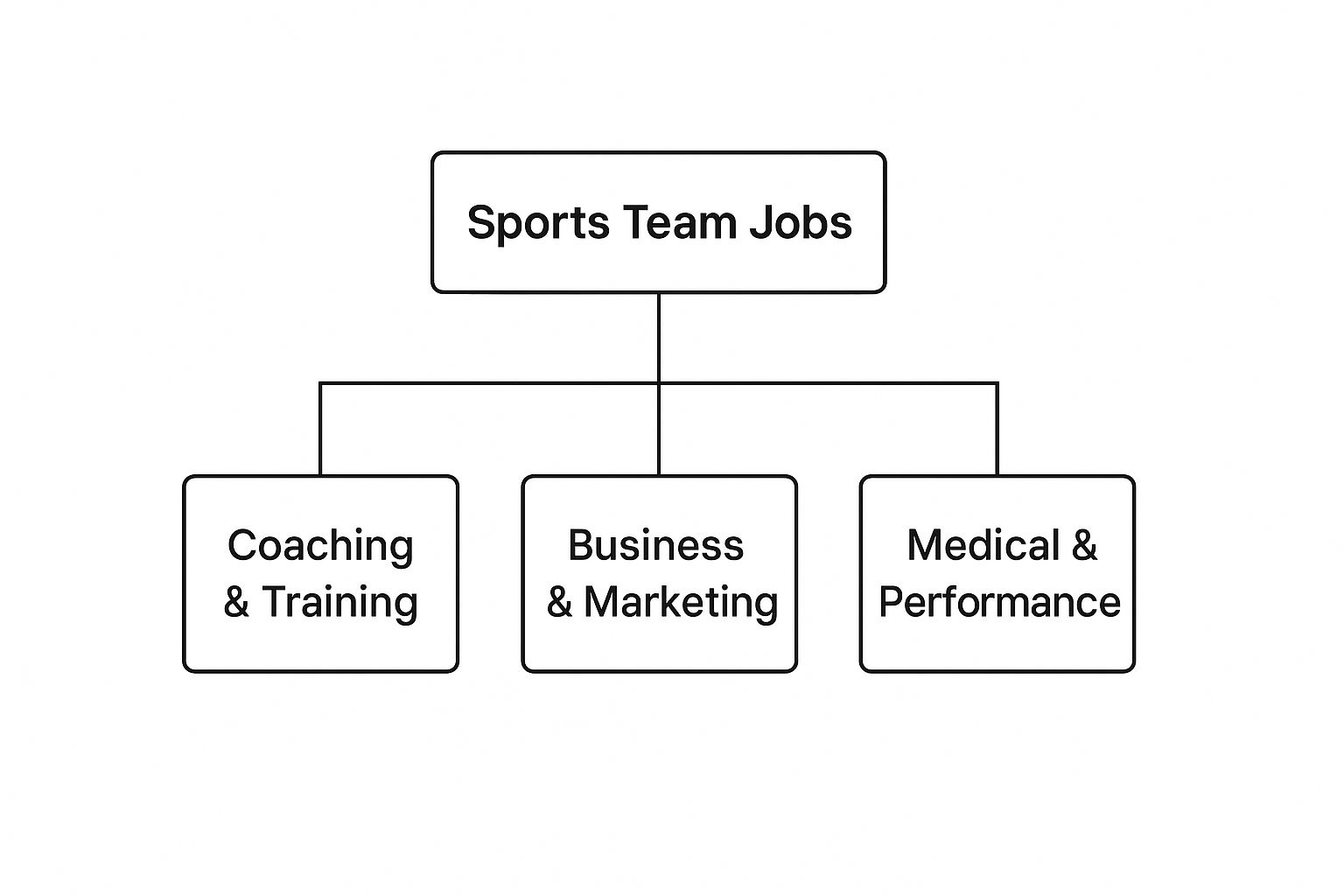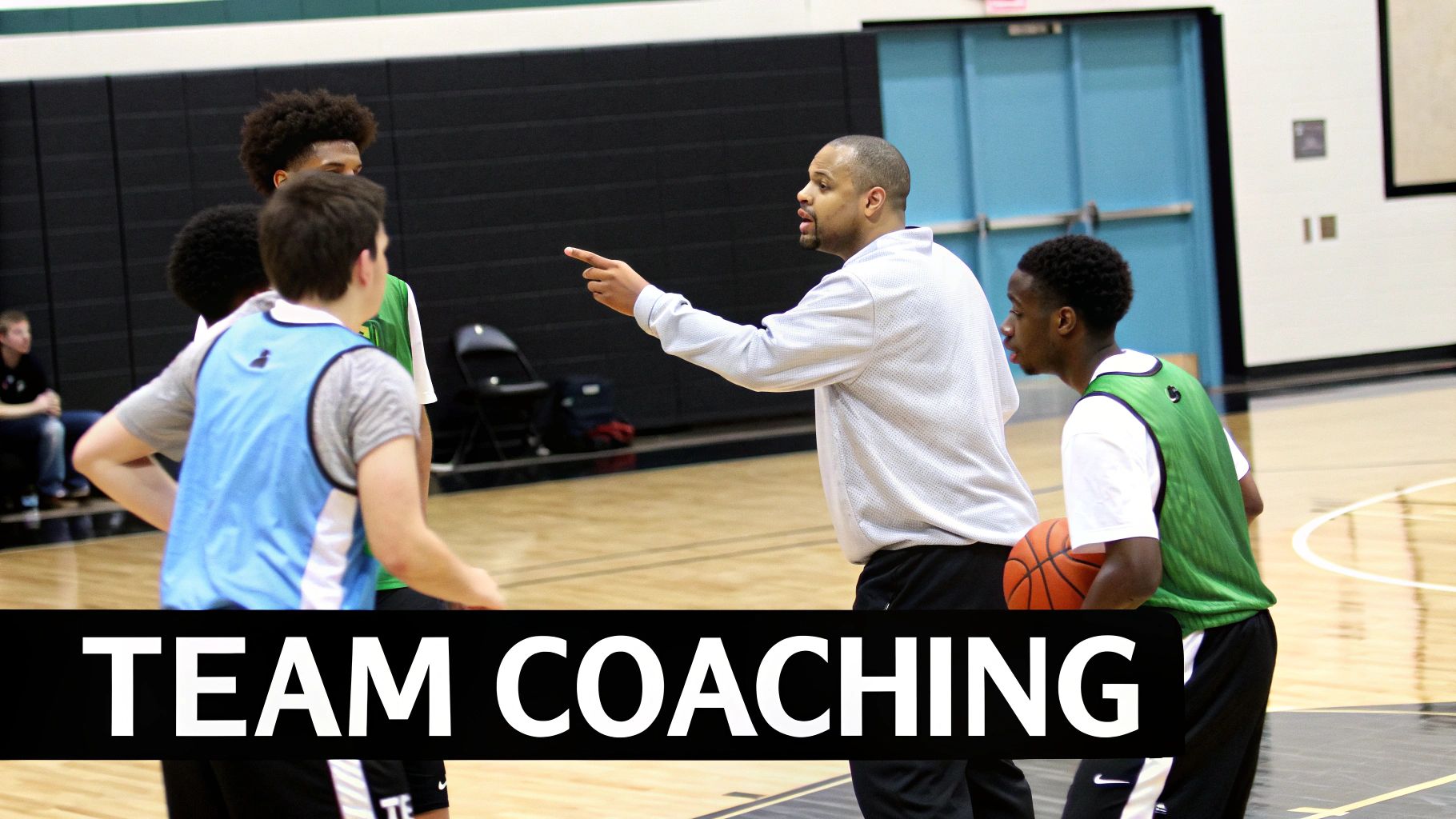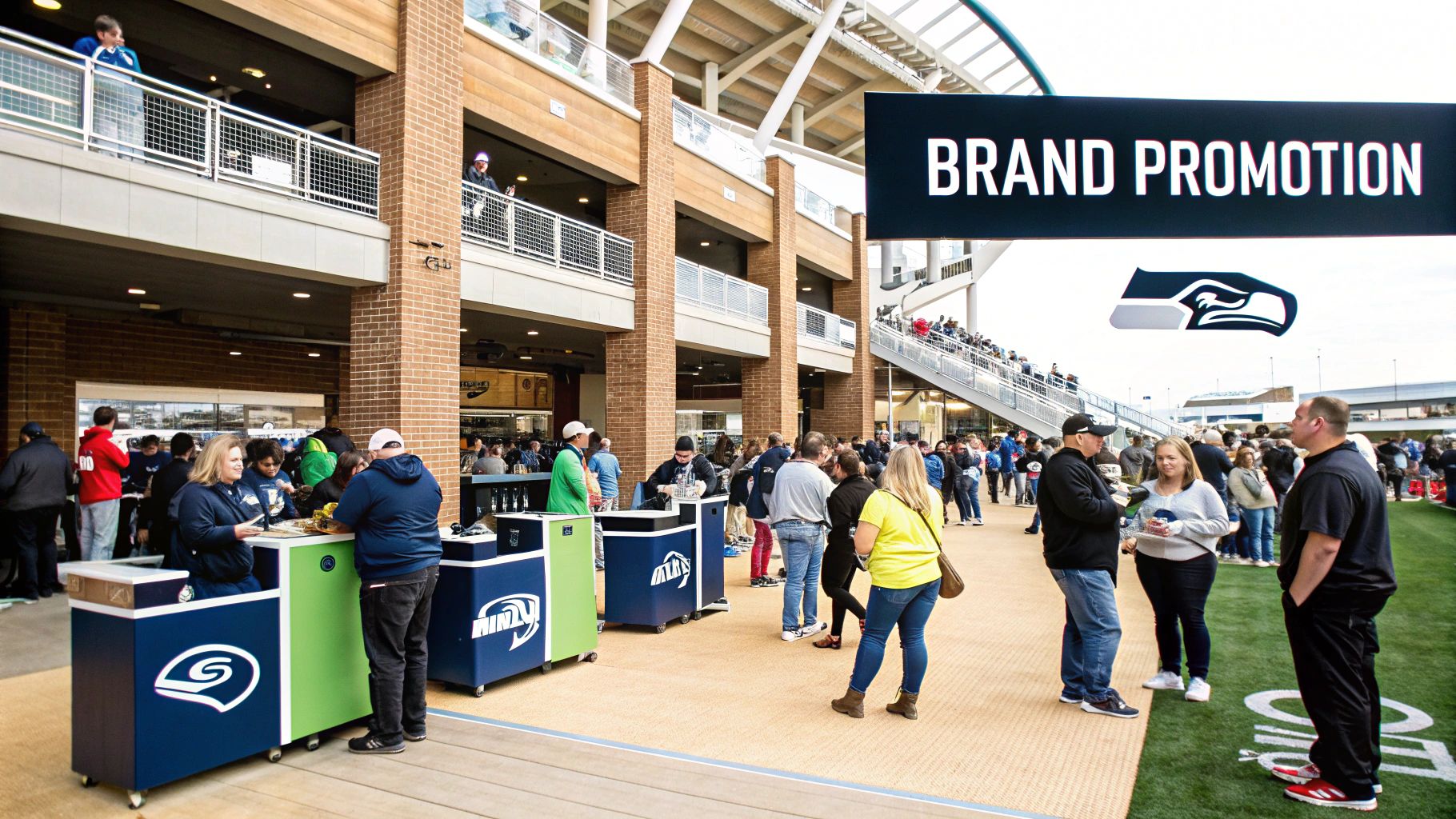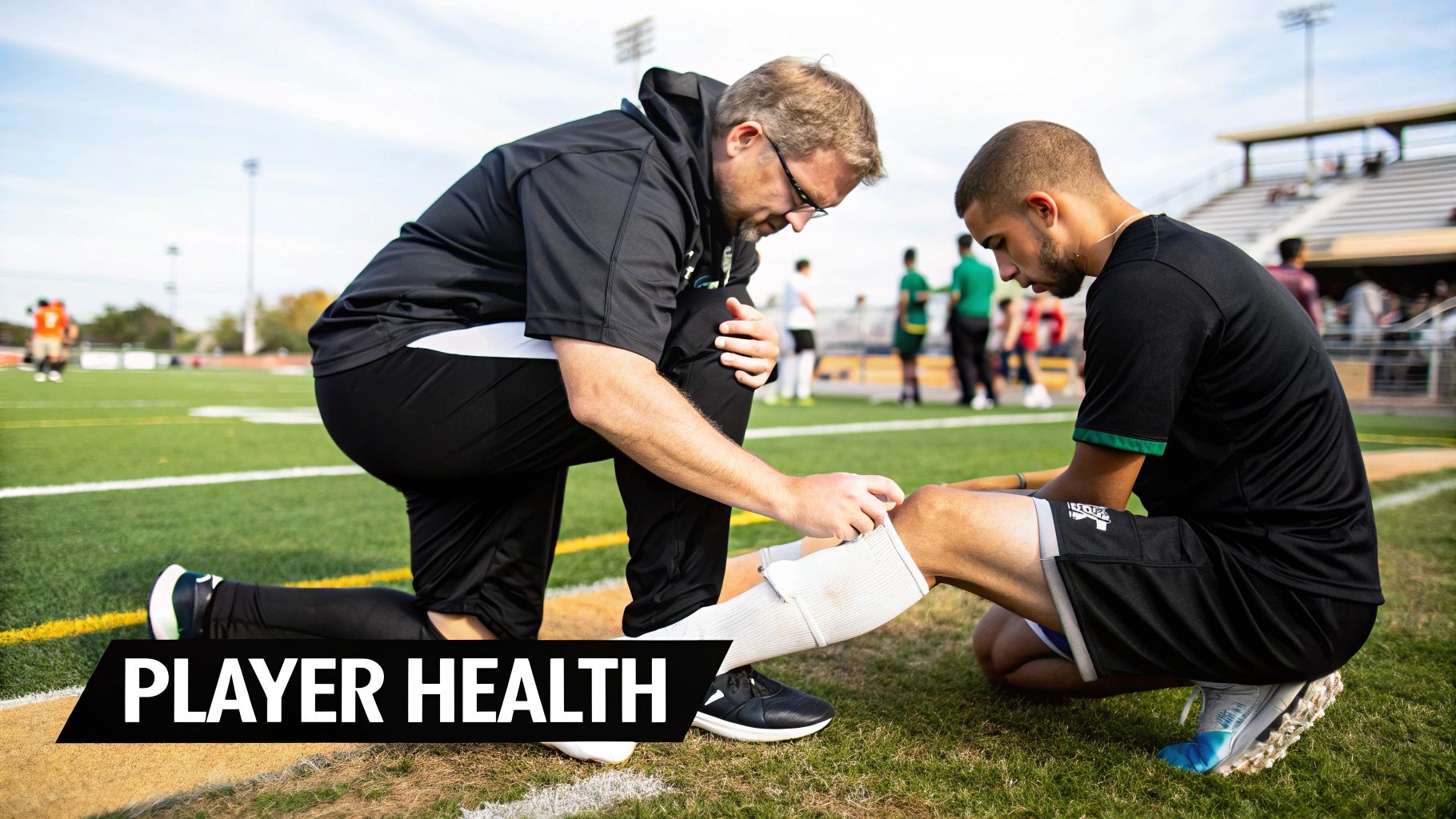
Your Ultimate Guide to Jobs For Sports Teams
So, you're dreaming of a career with your favorite sports team? It's way more possible than you might think. Forget what you see on TV for a second. Beyond the players and coaches, there are hundreds of essential business, creative, and technical jobs that make the whole show run.
Finding Your Place Beyond the Sidelines
When people think of jobs in sports, their minds usually jump straight to the head coach or the general manager. While those are definitely key roles, they're just the tip of the iceberg. A modern sports franchise is a full-blown, complex business that needs talented people in just about every professional field you can imagine.
Try thinking of your favorite team as a dynamic company. They need marketing pros to get fans in the seats, data analysts to hunt for a competitive edge, and an operations crew to handle everything from team travel to the stadium's Wi-Fi. Your passion for the game, when you mix it with real-world professional skills, can be an incredibly powerful combo.
The Modern Sports Team Structure
Most people are genuinely surprised when they learn just how many different career paths are available inside a single team. The opportunities go far beyond what happens on the field. To really get a handle on it, you can break down the organization into a few main categories.
This handy visual breaks down how jobs are typically grouped into coaching, business, and medical departments.

As the infographic shows, coaching is obviously a core part of the team, but the business and performance sides are every bit as critical. This creates a massive range of job opportunities for all kinds of skill sets.
To get a clearer picture, let's look at a quick breakdown of the main departments and the kinds of jobs you'll find in each.
Quick Overview of Key Job Categories in Sports
| Department | Primary Function | Example Job Titles |
|---|---|---|
| Business Operations | Manages the day-to-day business of the team. | General Manager, Director of Finance, HR Manager |
| Marketing & Comms | Builds the brand, engages fans, and sells tickets. | Marketing Director, Social Media Manager, PR Coordinator |
| Sales & Partnerships | Generates revenue through tickets and sponsorships. | Ticket Sales Rep, Corporate Partnerships Manager |
| Analytics & Tech | Uses data for player performance and business strategy. | Data Analyst, IT Specialist, Software Engineer |
| Medical & Performance | Keeps players healthy and performing at their peak. | Athletic Trainer, Strength Coach, Sports Scientist |
| Content & Creative | Produces videos, graphics, and stories for fans. | Video Producer, Graphic Designer, Content Creator |
This table just scratches the surface, but it gives you a solid idea of how your professional background could fit into the sports world. And if you're ready to start looking, a fantastic place to begin your search is on a specialized platform like www.sportsjobs.online.
Understanding the Sports Job Market
The demand for professionals in sports is real, though it definitely ebbs and flows with the seasons and major events. Before 2020, it wasn't uncommon for employment in U.S. sports teams and clubs to climb past 100,000 workers during the busy spring and summer months. At its peak in August 2019, the industry employed a whopping 120,578 people.
Even after the disruptions of recent years, the industry showed its toughness and began a steady recovery as games and events came back. This just goes to show the constant need for skilled staff across every single department. You can dive deeper into the numbers and explore more data about sports employment trends to see the full picture.
The bottom line is this: a sports team is a multi-faceted organization. It doesn't matter if your background is in finance, marketing, data, or healthcare, there's very likely a role for you. This guide is all about helping you figure out where you fit and how to get there.
Inside the Front Office: Business and Operations Roles

Sure, the magic happens on the field, but the game plan for the entire franchise gets drawn up in the front office. This is the command center where the real business decisions get made, turning a roster of incredible athletes into a thriving, profitable business. These are the jobs that demand sharp business minds and a real talent for organization.
Think of the front office as the place where the team’s vision, its finances, and its long-term strategy all collide. The people here are juggling everything from massive player contracts and multi-million dollar budgets to simply making sure the team gets from one city to the next without a single hiccup. It's an intense, dynamic environment that’s a perfect mix of sports passion and serious business smarts.
The Strategic Decision Makers
At the very top of the business side, you'll find the people steering the ship. These are high-stakes, high-pressure roles that directly shape both the team's performance and its bottom line.
- General Manager (GM): The GM is the architect of the team. They’re in charge of all player personnel decisions, like drafts, trades, and signing free agents. They work hand-in-glove with the coaches and scouts to assemble a roster that can win.
- Director of Operations: This person is a true logistics wizard. They manage the team's packed daily schedule, coordinate incredibly complex team travel, and handle all the moving parts for training camps and road trips. Their whole job is making sure everything runs so smoothly that the players can just focus on playing.
- Human Resources Manager: Just like any other major company, a sports team needs a solid HR department. The HR Manager handles employee relations, recruits for all non-player jobs, manages benefits, and makes sure the organization is following all league rules and labor laws.
These positions demand real leadership and the ability to stay cool under pressure. If you're looking for these kinds of leadership opportunities in the sports world, a great place to start is by checking out current front office openings on www.sportsjobs.online.
Managing the Money
No team, no matter how talented, can succeed without a rock-solid financial game plan. The finance and accounting folks are absolutely critical for managing revenue, keeping costs in check, and ensuring the team is stable for years to come. A team pulls in money from ticket sales, media rights, sponsorships, and merchandise, and every single dollar needs to be managed perfectly.
The Director of Finance or CFO sets the team's entire financial strategy, from budgeting player salaries to forecasting future revenue. They work with accountants and financial analysts who handle payroll, track every expense, and put together detailed financial reports for the owners and the league. These are dream jobs for numbers-savvy people who want to put their skills to work in a fast-paced, exciting industry.
A professional sports team is essentially a major corporation, often with annual revenues in the hundreds of millions of dollars. The finance team's ability to manage that cash flow is just as important as a star player's performance on the field.
Keeping the Facility First-Class
Today’s stadiums and training centers are more than just places to play, they're massive, complex venues that need a dedicated team to run them. These facilities are year-round entertainment hubs, hosting everything from concerts to corporate events.
The Facilities Manager is in charge of all the maintenance, security, and day-to-day operations of the stadium or arena. This includes managing the grounds crew who keep the field immaculate, the custodial staff, and the tech teams running the scoreboards and sound systems. They also have to coordinate the logistics for every single event, from parking to concessions.
Working in facilities and event management is a hands-on career that’s all about problem-solving and creating an unforgettable experience for the fans. It's a crucial piece of the puzzle when it comes to jobs for sports teams.
Winning with Data Analytics and Technology Jobs

Let's be honest, the days of relying purely on gut instinct are long gone. The real competitive edge in sports today is often buried in data. Numbers, algorithms, and tech have totally reshaped how teams operate, creating a massive demand for experts who can translate raw data into a winning game plan.
This is where you'll find some of the most exciting and fastest-growing jobs on any team roster. These roles are all about uncovering the hidden patterns and insights that give a team that critical advantage. Think of it as being a modern-day scout. Instead of just watching a player, you're digging into thousands of data points to figure out their true impact. It's the perfect sweet spot where a love for the game meets a real knack for technology.
The Brains Behind the Strategy
Behind the scenes, data analysts and scientists are the core of a team's modern intelligence unit. They're the ones using statistical models and powerful software to give coaches and GMs the hard evidence they need to make smarter calls.
- Data Scientist: This is a big-picture role. A data scientist might build a complex model to predict a college player's chances of success in the pros or analyze which player combinations are most effective on the field. They are the true architects of a team's data strategy.
- Performance Analyst: These folks are laser-focused on the athletes themselves. They use data from wearables, GPS trackers, and practice footage to monitor player workload, spot early signs of fatigue, and help prevent injuries before they ever happen.
- Video Analyst: This job is so much more than just cutting up game film. A video analyst meticulously tags every single play with detailed data, breaking down an opponent's tendencies, charting player movements, and finding strategic weaknesses the team can exploit.
Getting into these roles means you need a deep understanding of both the sport and the tools used to break it down. To get a feel for what teams are looking for, check out openings like this Data Science Lead in Sports Analytics role.
The Tech That Powers the Team
Of course, behind every analyst, there's a crew of tech professionals building and maintaining the infrastructure that makes it all work. As sports organizations have become more like tech companies, these jobs have become absolutely essential.
The global sports industry is booming, especially in roles tied to technology and health. The UK, for instance, saw a 20% jump in sports and fitness jobs from 2021 and is a European leader in sports tech startups. Meanwhile, in Australia, sports technology pulls in around AU$4.69 billion each year. This growth highlights the incredible number of opportunities opening up worldwide. You can dig deeper into the growth of sports tech and health employment trends to see the full picture.
From custom-built apps for players to massive stadium-wide networks, tech pros are the ones who keep the entire operation humming. If you're looking for jobs for sports teams that involve code, servers, and hardware, this is your turf.
Key Tools of the Trade
To really make it in sports analytics and tech, you have to be fluent in a specific set of languages and software. These are the tools that let you transform messy, raw data into clear, actionable insights for the front office and coaching staff.
- Programming Languages: Python and R are the undisputed kings here. You'll use them for everything from cleaning data and running statistical models to building machine learning algorithms.
- Database Management: Knowing SQL is completely non-negotiable. It’s how you'll pull the exact information you need from massive databases holding player stats, scouting reports, and even ticketing data.
- Visualization Tools: Making data understandable is key. Tools like Tableau or Power BI are crucial for creating the charts, graphs, and interactive dashboards that help a non-technical person, like a coach, see the story in the numbers.
If you have these technical skills and a genuine passion for the game, the world of sports data and technology offers an incredible career path. You could be the one who finds the next game-changing insight. For those ready to jump in, you can find current openings at www.sportsjobs.online.
Connecting with Fans Through Marketing and Media
What's a team's most valuable asset? It's the unbreakable bond with its fans. The marketing and media departments are the guardians of that connection. These are the jobs for people who think creatively, plan strategically, and have a gut-level understanding of what makes a fanbase roar.
Their job is to build the brand, keep the community buzzing, and ultimately, turn a casual observer into a die-hard supporter for life. They are storytellers, community organizers, and brand protectors all rolled into one. If you're a gifted communicator with a creative streak, this part of the front office might be calling your name.
Crafting the Team's Public Voice
The marketing and media division is where the team's personality truly takes shape. This is about creating a consistent, authentic voice that connects with fans on a deep, emotional level.
- Marketing Director: This person is the architect of the entire marketing strategy. They’re behind the big advertising campaigns, the ticket promotions, and the gameday experiences designed to pack the stands and drive revenue.
- Social Media Manager: In this day and age, this is a front-line, 24/7 role. They run the team's daily dialogue on platforms like X (formerly Twitter), Instagram, and TikTok, dropping real-time content that keeps fans plugged in around the clock.
- Content Creator: This is your crew of videographers, graphic designers, and writers who produce the compelling stories fans can't get enough of. From epic hype videos and candid player interviews to viral social media graphics, they make the magic happen.
All these roles are focused on one thing: building a genuine connection. They tell the stories that go beyond just wins and losses, highlighting player personalities, team history, and community roots to forge a bond that lasts a lifetime.
Protecting the Brand and Managing the Message
Every team lives under a microscope, and it's the communications and public relations (PR) staff who manage the team’s reputation through it all. Their mission is to keep the team’s public image positive and to skillfully handle every single interaction with the media.
A Public Relations Specialist is the one writing press releases, setting up interviews for players and coaches, and scripting talking points for the front office. When a crisis inevitably hits, they're the first responders, working to manage the fallout, control the narrative, and protect the organization's integrity. These pros are masters of communication, staying cool and strategic even when the pressure is immense. A huge part of their job is building strong, trusted relationships with journalists to ensure the team gets a fair shake.
Think of the PR team as the organization's shield. They anticipate potential issues, prepare responses, and work tirelessly behind the scenes to maintain a positive public perception, which is crucial for securing sponsorships and maintaining fan loyalty.
If you're ready to find a role that combines creativity with strategy, you can explore the latest marketing and media jobs for sports teams by visiting www.sportsjobs.online. Opportunities range from entry-level positions to director-level roles across all major sports.
Key Skills for Marketing and Media Roles
To make it in this fast-moving, creative world, you need a very specific blend of skills. Technical ability is important, sure, but your talent for communicating and connecting with people is what will really make you stand out. For anyone just breaking in, getting real-world experience is everything. An NHL marketing internship could be the perfect launchpad to build your resume and start making those crucial industry connections.
Here’s a look at how different skills map to the key jobs in this space.
Skills Mapping for Top Sports Team Jobs
| Job Category | Key Hard Skills (Technical) | Essential Soft Skills (Interpersonal) |
|---|---|---|
| Marketing | Digital advertising, email marketing platforms, CRM software, market research | Creativity, strategic thinking, project management, persuasive communication |
| Social Media | Content creation tools (e.g., Canva, Adobe), social media analytics, scheduling software | Community management, quick thinking, brand voice consistency, humor |
| Public Relations | Press release writing, media monitoring tools (e.g., Cision), crisis management | Strong writing and speaking skills, diplomacy, relationship building, integrity |
| Content Creation | Video editing (e.g., Premiere Pro), graphic design (e.g., Photoshop), photography | Storytelling, attention to detail, collaboration, adaptability |
Knowing which skills matter most for each path helps you focus your energy where it counts. Whether you're a storyteller, a strategist, or a community builder, there's a role where your talents can shine.
Your Playbook for Landing a Job in Sports

Let's be real: breaking into the sports industry is famously tough. But it’s far from impossible if you have the right game plan. It’s not about luck. It's about being smart, strategic, and persistent.
This is your practical, step-by-step guide to getting your foot in the door. We'll walk through everything from getting that first bit of experience to absolutely nailing the interview. Think of this as your personal playbook for turning that dream into a career.
Gain Hands-On Experience
In sports, experience isn't just a suggestion, it's everything. Hiring managers want to see that you've already been in the trenches, even if it was as a volunteer. This is where you have to be proactive.
- Internships: This is your golden ticket. Most pro teams and major college athletic departments have internship programs. They're hands-down the best way to learn the ropes, meet people, and get a recognizable logo on your resume.
- Volunteering: Don't sleep on smaller opportunities. Helping out a local minor league team, a college gameday event, or even a youth sports league shows you have the passion and initiative they're looking for. These roles often give you more real responsibility than you'd expect.
Even a role that seems a little unconventional can be a huge asset. A mascot internship, for example, isn't just about wearing a suit. It's a crash course in event operations, fan engagement, and being a brand ambassador. You can even find unique gigs like a Mascot Intern position for an MLS team that offer incredible behind-the-scenes experience.
Tailor Your Application Materials
Your resume and cover letter are your highlight reel. A generic, one-size-fits-all application is the fastest way to get tossed in the "no" pile. You have to tailor it. Every. Single. Time.
Your Resume: Stop just listing your duties. Start showcasing your results. Instead of "assisted customers" at your retail job, try "increased department sales by 15% through proactive customer engagement." Quantifying your achievements translates your skills into the language of business, a language every single team speaks.
Your Cover Letter: This is where you let your personality and passion shine. Connect your skills directly to what that specific team needs. Did you notice their latest marketing campaign? Mention it. See a community program they just launched? Talk about how you could contribute. This shows you've done your homework and you're not just blasting out applications.
The key is to translate what you’ve already done into a sports context. The skills it takes to be a project manager at a tech company are the same core skills you need to be an operations coordinator for a team. Your job is to connect those dots for them.
Build Your Professional Network
The sports world is a surprisingly small, tight-knit community. So, networking isn't just a good idea; it's how things get done. You’d be shocked how many jobs are filled through referrals before they ever hit a public job board.
Here's how to make real connections:
- Use LinkedIn: Find people doing the jobs you want. Don't just send a blind request, add a personal note. Ask for a 15-minute informational chat to hear about their career path. People love to talk about their journey.
- Attend Industry Events: If there's a sports business conference or a local panel discussion, go. These events are built for making connections.
- Be a Real Person: Focus on building genuine relationships, not just asking for a job. People help people they know and trust.
When you're ready to make a move, having a network of people who can vouch for you is a game-changer. And while you build those relationships, you can keep a close eye on openings across the industry at www.sportsjobs.online, which pulls together jobs from a ton of different teams and leagues.
Prepare for the Interview
You got the interview. Awesome. Now it’s time to prove you’re the one. Preparation is what separates a good candidate from a new hire. You have to show them you have the skills, the passion, and a real understanding of their business.
Be ready for questions like, "Why do you want to work in sports?" and "What do you know about our organization?" Your answers need to be specific and full of energy. Show them you know their brand, their rivals, and the challenges they're facing. This is your shot to let that passion come through and seal the deal.
Exploring Global Opportunities in Sports
Don't let your zip code limit your passion for sports. The love of the game is a universal language, and that shared passion has fired up an incredible number of jobs for sports teams all over the world. While the U.S. market is obviously massive, thinking internationally can unlock a whole new world of exciting career paths you might have never considered.
You’ve got booming markets in Europe, Asia, and Latin America that are hungry for talented professionals. Whether it’s the Premier League in England or emerging basketball leagues down in Australia, the business of sports is expanding everywhere. That growth means there's a serious need for the exact same roles we’ve been talking about, like operations, marketing, and data analytics.
Getting a Handle on the European Sports Job Market
Over in Europe, the sports sector isn't just a pastime; it's a huge economic engine and a major employer. We're not just talking about a few big-name clubs, either. It’s a sprawling industry that includes everything from national federations and smaller community teams to the tech and media companies that support them all.
The job market there is incredibly diverse and robust. To give you some perspective, recent data from the European Union shows the sports sector provides jobs for 1.5 million people. That’s 0.8% of the entire workforce across the EU. It’s a powerful reminder of just how many people build their careers around the games they love. You can dig deeper into the scale of employment in European sports yourself.
If you’re starting to think about an international career, a great place to start your search is www.sportsjobs.online, which lists roles from teams and companies across the globe.
Who's Getting Hired in Global Sports?
One of the most encouraging things about the international sports job market is who gets hired. While there's a healthy mix of ages, the industry is a fantastic launchpad for younger professionals. In the EU, for example, the sports sector employs more than double the proportion of young people (ages 15-29) compared to the overall job market.
This makes the global sports industry an amazing place for young, ambitious people to launch a career. Teams and leagues abroad are actively seeking fresh talent and new ideas.
When it comes to education, the paths are more varied than you might think. You don't necessarily need a master's degree to get your foot in the door. The data shows a really healthy mix of educational backgrounds among sports professionals abroad:
- Nearly 46% of workers have a medium-level education, like vocational training or an associate's degree.
- About 40% hold higher education qualifications, such as a bachelor's or master's degree.
- Only around 14% have a low level of educational attainment.
This proves there isn't just one path to a career in sports. Whether you have hands-on vocational skills or an advanced academic degree, there are jobs out there where your background is a perfect fit. Broadening your search to include global opportunities can seriously expand your options and lead to an incredible career adventure.
Of course. Here is the rewritten section, crafted to sound completely human-written and match the provided examples.
Your Top Questions About Sports Careers Answered
Thinking about breaking into the world of professional sports? It can feel like a tough nut to crack, but you're not alone. We've seen the same questions pop up time and again, so I’ve pulled them together to give you some straight, honest answers.
Let's clear things up so you can start looking for jobs with confidence.
Do I Have to Be a Former Athlete to Work for a Team?
Absolutely not. This is probably the biggest myth out there.
While playing experience is definitely a plus for coaching or some scouting roles, it's not a ticket into the vast majority of jobs. Think of a modern sports team as a full-blown company, they need sharp people in business, creative, and tech roles to make everything run.
Teams are always on the hunt for skilled accountants, marketing pros, data analysts, and IT specialists. What really moves the needle is your professional expertise. A deep passion for the game is a massive advantage, but you don't need to have been on the field to have it.
What's the Best Way to Get My Foot in the Door with No Sports Experience?
Internships. Period. They are, without a doubt, the single best way to get real, hands-on experience.
Almost every pro team and college athletic department runs internship programs. These are not just coffee-and-copies gigs; they offer an incredible look behind the curtain and are a fantastic way to build both your resume and your network.
Volunteering is another solid option. Helping out at local sporting events, with a minor league team, or inside a university's athletic department shows a ton of initiative and passion. These experiences often give you more responsibility than you'd think and really stand out to hiring managers.
Are Sports Jobs Only in Big Cities?
While the major league teams naturally set up shop in big metro areas, there are thousands of other opportunities scattered everywhere. You just have to know where to look.
Check out minor league teams, college athletic departments at all levels like the NCAA and NAIA, sports governing bodies, and the countless companies that support the entire industry. These organizations are in cities and towns of all sizes and offer incredible career paths.
You can start your search on a platform like www.sportsjobs.online and filter by location. You might be surprised to find great jobs for sports teams much closer than you think.
A lot of people think you have to pack up and move to a huge city to work in sports. The truth is, opportunities are everywhere, from college towns to smaller cities with minor league affiliates. There are so many different environments where you can build a great career.
How Important Is Networking, Really?
It’s everything. The sports industry is a surprisingly tight-knit community, and you'd be shocked at how many jobs get filled through referrals and personal connections.
Make it a point to attend industry conferences (even virtual ones), connect with people on LinkedIn, and ask for informational interviews. Don't just ask for a job; focus on building genuine relationships and letting your passion for the industry shine through. A strong network won't just give you a heads-up on openings, it can give you a powerful advocate when you apply.
Hundreds of jobs are waiting for you!
Subscribe to membership and unlock all jobs
Sports Analytics
We scan all major sports and leagues
Updated Daily
New jobs are added every day as companies post them
Refined Search
Use filters like skill, location, etc to narrow results
Alerts
You can get daily alerts in your email for a specific search
Access to job postings from top teams and companies
Daily updates and notifications based on your preferences
🎯 Over 90% of customers chose to renew their subscriptions after the initial sign-up
Monthly
$6.99
per month
✓ Flexible monthly billing
✓ Unlimited access to all jobs
✓ Advanced filtering tools
✓ Daily job alerts
✓ Exclusive discount codes
✓ Cancel anytime
BEST VALUE
Yearly
$39
per year • Only $3.25/mo
✓ Save 50% vs monthly
✓ Unlimited access to all jobs
✓ Advanced filtering tools
✓ Daily job alerts
✓ Exclusive discount codes
✓ Cancel anytime
Lifetime
$59
one-time • forever
✓ Pay once, access forever
✓ Unlimited access to all jobs
✓ Advanced filtering tools
✓ Daily job alerts
✓ Exclusive discount codes
✓ Best long-term value